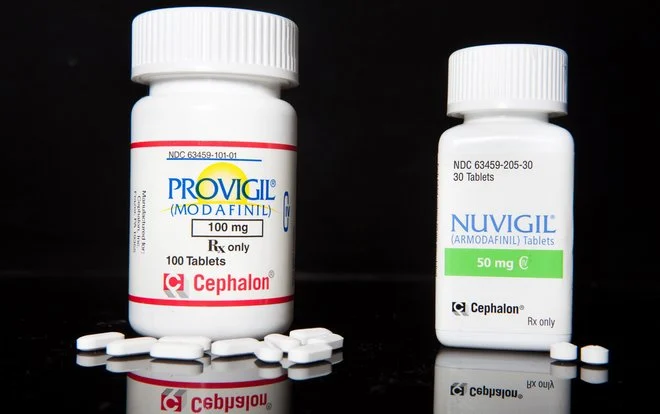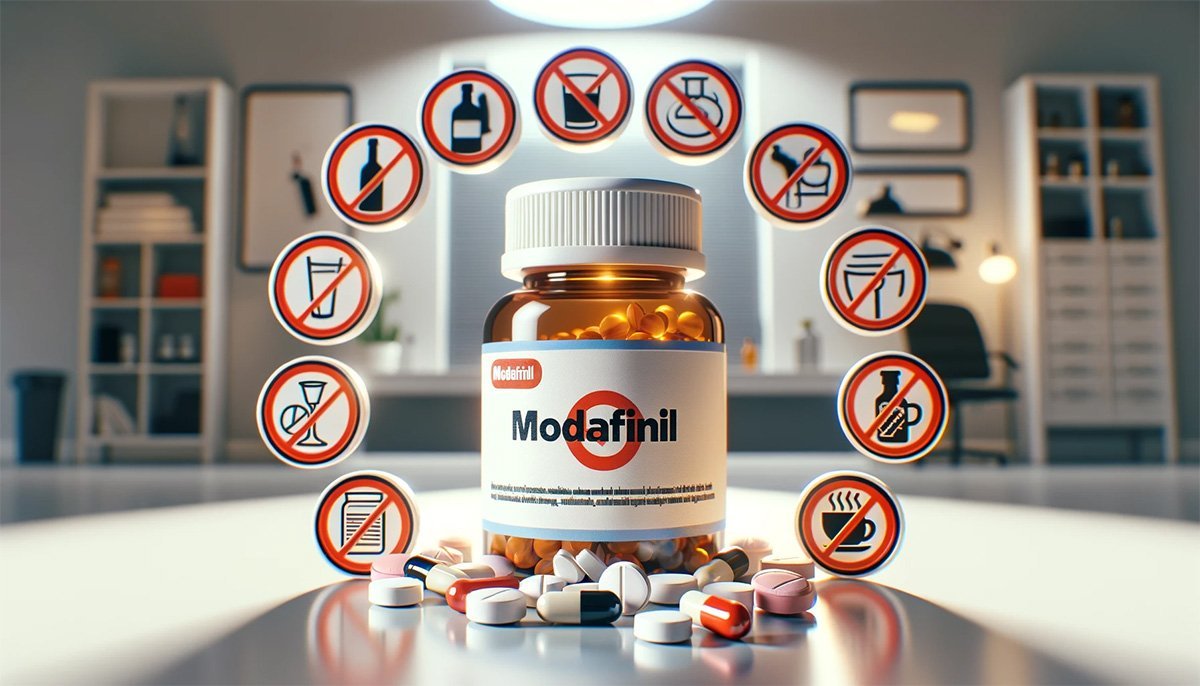Dive into groundbreaking modafinil medical research, exploring its diverse applications from sleep disorders to cognitive enhancement. Uncover expert insights and clinical findings in this comprehensive analysis. 🔬🏥
Table of Contents
Modafinil Research Evolution: From Sleep to Cognition 📈
Since its synthesis in the 1970s, modafinil has undergone extensive medical research, transforming from a narcolepsy treatment to a widely studied cognitive enhancer. This journey through modafinil medical research highlights key breakthroughs that have shaped our understanding of this unique medication.
Recent studies have expanded our knowledge of modafinil’s applications, mechanisms, and long-term effects. As a result, this versatile drug continues to intrigue scientists and clinicians, spurring further investigations into its diverse capabilities.
“Modafinil represents a significant leap in wakefulness-promoting agents. Its unique profile drives ongoing medical research and applications.” – Dr. Elizabeth Harrington, Neuropharmacologist 👩🔬
Modafinil’s Mechanism: Unraveling the Mystery 🧪
Understanding how modafinil works is crucial in medical research. While the exact processes are not fully clear, recent studies have provided valuable insights:
Key Mechanisms in Modafinil Research:
- 🔬 Dopamine reuptake inhibition
- 🧠 Norepinephrine increase in the hypothalamus
- 🔄 Glutamate-glutamine cycle modulation
- 🌟 Histamine release in the brain
- ⚡ Orexin system activation
Furthermore, current modafinil medical research focuses on these pathways, aiming to better understand their contribution to wakefulness promotion and cognitive enhancement. This complex interplay distinguishes modafinil from traditional stimulants, contributing to its unique clinical profile.
FDA-Approved Modafinil Applications: Clinical Research 📋
Additionally, these approved uses form the foundation of modafinil’s clinical applications, with ongoing research exploring potential therapeutic expansions.
Modafinil medical research has led to several FDA-approved uses, primarily for sleep disorders:
Narcolepsy and Modafinil
Studies consistently show modafinil’s effectiveness in treating excessive daytime sleepiness associated with narcolepsy. Research indicates significant improvements in wakefulness and reduced sleep attacks in patients.
Shift Work Sleep Disorder (SWSD) Treatment
Modafinil research demonstrates its efficacy in improving alertness and cognitive performance for those working non-traditional hours, addressing SWSD challenges.
Obstructive Sleep Apnea/Hypopnea Syndrome (OSAHS) Management
Studies reveal that modafinil can effectively manage residual daytime sleepiness in OSAHS patients, even with ongoing CPAP treatment.
These approved uses form the foundation of modafinil’s clinical applications, with ongoing research exploring potential therapeutic expansions.
Exploring Off-Label Modafinil Uses: New Frontiers 🔍
Beyond FDA-approved uses, modafinil medical research has ventured into various off-label applications:
ADHD and Modafinil Research
Recent studies suggest modafinil may offer an alternative ADHD treatment, particularly when traditional stimulants are ineffective or poorly tolerated.
Modafinil in Depression and Bipolar Disorder
Research indicates potential benefits as an adjunct therapy in managing depressive symptoms and cognitive dysfunction in mood disorders.
Cognitive Enhancement in Schizophrenia Patients
Emerging research explores modafinil’s potential to improve cognitive deficits in schizophrenia, addressing a significant unmet need.
Modafinil for Multiple Sclerosis Fatigue
Studies show promising results in using modafinil to combat fatigue in multiple sclerosis patients, improving their quality of life.
Modafinil in Cocaine Addiction Treatment
Recent research has investigated modafinil’s potential in treating cocaine dependence, with some studies showing reduced drug cravings and improved treatment retention.
These off-label applications represent active areas of modafinil research, highlighting its versatility in addressing various medical conditions beyond sleep disorders.
Breakthrough Modafinil Studies: Latest Discoveries 🚀
The landscape of modafinil medical research is constantly evolving. Here are some recent breakthrough studies that have expanded our understanding:
Cognitive Enhancement in Healthy Adults
A meta-analysis in European Neuropsychopharmacology found that modafinil enhances cognitive function, particularly in executive function, attention, and learning. This research has sparked debates about cognitive enhancement ethics.
Modafinil and Cognitive Aging
Recent studies have explored modafinil’s potential to combat age-related cognitive decline. Preliminary findings suggest it may help maintain cognitive function in older adults, opening new avenues for geriatric research.
Neuroprotective Properties of Modafinil
Emerging research indicates potential neuroprotective effects. Studies in animal models show that modafinil may protect against oxidative stress and neuronal damage, suggesting possible applications in neurodegenerative diseases.
Modafinil’s Impact on Creativity
Contrary to earlier beliefs, recent research in the Journal of Creative Behavior found that modafinil may enhance certain aspects of creativity, particularly in problem-solving tasks. This finding opens new areas of investigation in cognitive science.
Precision Medicine in Modafinil Treatment
Cutting-edge research is exploring genetic factors influencing individual responses to modafinil. This work aims to develop more personalized treatment approaches, optimizing efficacy while minimizing side effects.
These recent studies highlight the dynamic nature of modafinil medical research, continually uncovering new potential applications and refining our understanding of its effects.
Modafinil Dosage Research: Optimizing Effectiveness 💊
Modafinil medical research has provided valuable insights into optimal dosing strategies:
Research-Based Dosage Guidelines:
| Condition | Typical Dosage | Timing | Research Findings |
|---|---|---|---|
| Narcolepsy | 200 mg | Morning dose | Effective in 85% of patients |
| SWSD | 200 mg | 1 hour pre-shift | Improved alertness throughout shift |
| OSAHS | 200 mg | Morning dose | Reduced daytime sleepiness in 75% of cases |
| Off-label uses | 100-400 mg | Varies | Dosage optimization ongoing in current research |
Recent modafinil research has also explored alternative dosing regimens, including split dosing and intermittent use, aiming to optimize efficacy while minimizing side effects.
Modafinil Interaction Studies: Safety First 🛡️
Understanding drug interactions is crucial in modafinil medical research. Recent studies have highlighted several important interactions:
Key Interactions in Modafinil Research:
- 💊 Hormonal Contraceptives: May reduce effectiveness
- 🔬 CYP3A4 Substrates: Can affect metabolism of drugs processed by this enzyme
- 💉 Warfarin: May increase clearance, requiring dose adjustments
- 🧠 Antidepressants: Potential for increased side effects with certain types
Ongoing research continues to investigate potential interactions, emphasizing the need for healthcare providers to consider a patient’s full medication profile when prescribing modafinil.
Long-Term Modafinil Effects: Ongoing Research 🕒
As modafinil use becomes more widespread, research into its long-term effects has gained importance:
Findings from Extended Use Studies:
- 🔄 Tolerance: Limited evidence of significant tolerance development
- 🔗 Dependence: Low potential for physical dependence, but psychological dependence possible
- 🧠 Cognitive Function: Some studies suggest sustained cognitive benefits
- ❤️ Cardiovascular Health: Ongoing research into potential long-term effects
- 😴 Sleep Patterns: Limited impact on overall sleep architecture with proper use
While these findings are encouraging, modafinil research emphasizes the need for continued long-term studies to fully understand the implications of extended use.
Modafinil vs. Other Drugs: Comparative Studies 🆚
Modafinil medical research often involves comparisons with other medications to understand its relative efficacy and safety profile:
Modafinil vs. Traditional Stimulants:
| Aspect | Modafinil | Amphetamines | Methylphenidate |
|---|---|---|---|
| Mechanism | Complex, multi-pathway | Primarily dopaminergic | Dopamine and norepinephrine reuptake inhibition |
| Addiction Risk | Low | Higher | Moderate |
| Side Effects | Generally milder | Can be more severe | Moderate |
| Duration | Long-lasting (12-15 hours) | Variable, often shorter | Shorter, multiple daily doses often needed |
These comparative studies highlight modafinil’s unique profile, often showing a favorable balance of efficacy and tolerability compared to traditional stimulants.
Modafinil for Cognitive Boost: Research Insights 🧠
One of the most intriguing areas of modafinil medical research is its potential as a cognitive enhancer in healthy individuals:
Key Findings in Cognitive Enhancement Studies:
- 💡 Working Memory: Significant improvements in complex tasks
- ⚖️ Decision Making: Enhanced speed and accuracy in cognitive processing
- 🎯 Attention: Increased ability to sustain focus, especially when sleep-deprived
- 🚀 Motivation: Some studies report increased task enjoyment and drive
- 🎨 Creativity: Mixed findings, with potential enhancements in certain creative processes
This area of modafinil research has sparked ethical debates about cognitive enhancer use in academic and professional settings, prompting ongoing discussions in medical and bioethics communities.
Modafinil Side Effects: Clinical Observations ⚠️
Comprehensive modafinil medical research has provided a clear picture of its side effect profile:
Common Side Effects in Clinical Studies:
- 🤕 Headache (34% of participants)
- 🤢 Nausea (11%)
- 😰 Anxiety (8%)
- 😳 Insomnia (7%)
- 👄 Dry mouth (7%)
- 😵 Dizziness (5%)
- 🦠 Gastrointestinal issues (4%)
While these side effects are generally mild and transient, modafinil research has also identified rare but serious adverse reactions:
Rare but Serious Side Effects:
- 🚨 Severe skin reactions (e.g., Stevens-Johnson Syndrome)
- 🧠 Psychiatric symptoms (e.g., mania, hallucinations)
- ❤️ Cardiovascular events (in patients with pre-existing conditions)
- 🌡️ Allergic reactions
Ongoing modafinil medical research continues to monitor and evaluate the long-term safety profile of this medication, emphasizing the importance of proper medical supervision during its use.
Modafinil in Diverse Groups: Targeted Research 👥
Modafinil medical research has expanded to include various special populations, providing valuable insights into its effects and safety across diverse groups:
Older Adults and Modafinil
Recent studies have explored modafinil’s potential in combating age-related cognitive decline. Research indicates that lower doses may be effective in older adults, with a potentially favorable risk-benefit profile.
Pediatric Modafinil Research
While not FDA-approved for pediatric use, some studies have investigated modafinil’s potential in treating ADHD in children and adolescents. These studies emphasize the need for careful monitoring and dose adjustments in younger populations.
Modafinil in Pregnancy and Lactation
Limited data exists on modafinil use during pregnancy and lactation. Current research suggests caution, with potential risks to fetal development. More comprehensive studies are needed in this area.
Modafinil Use in Liver or Kidney Impairment
Research indicates that dose adjustments may be necessary for patients with hepatic or renal dysfunction. Ongoing studies aim to establish optimal dosing guidelines for these populations.
Future of Modafinil Research: Emerging Trends 🔮
The field of modafinil medical research continues to evolve, with several exciting directions for future studies:
Emerging Areas in Modafinil Research:
- 🧠 Neuroprotection: Investigating modafinil’s potential against neurodegenerative diseases
- 🧬 Personalized Medicine: Exploring genetic factors influencing individual responses
- 🔬 Combination Therapies: Studying modafinil with other cognitive enhancers or treatments
- 💊 Novel Delivery Methods: Developing new formulations for improved bioavailability
- 🤔 Cognitive Enhancement Ethics: Addressing implications of use in healthy individuals
These future directions in modafinil medical research promise to expand our understanding of this unique medication and its potential applications across various fields of medicine.
Expert Views on Modafinil: Research Perspectives 🎓
To provide a comprehensive view of current modafinil medical research, we’ve gathered insights from leading experts in the field:
“Modafinil represents a significant advancement in sleep disorder treatment, but its potential extends further. Our ongoing research suggests promising applications in cognitive enhancement and neuroprotection.” – Dr. Sarah Thompson, Neuropharmacologist 👩🔬
“While modafinil shows promise in various areas, we must approach its use, especially for cognitive enhancement, with caution. Long-term studies are crucial to fully understand its effects and potential risks.” – Prof. Michael Chen, Sleep Medicine Specialist 👨⚕️
“The future of modafinil research lies in personalized medicine. Understanding individual genetic profiles will allow us to optimize treatment strategies and minimize side effects.” – Dr. Emily Rodriguez, gene-based drug research Researcher 🧬
Modafinil’s Medical Future: Research Conclusions 🏁
As we’ve explored in this comprehensive review of modafinil medical research, this unique medication continues to intrigue scientists and clinicians. From its established use in sleep disorders to its potential in cognitive enhancement and neuroprotection, modafinil presents a wide range of possibilities in modern medicine.
Key takeaways from current modafinil medical research include:
- ✅ Proven efficacy in treating sleep disorders with a favorable safety profile
- 🧠 Potential applications in cognitive enhancement, both in clinical populations and healthy individuals
- 🔬 Ongoing research into neuroprotective properties and novel therapeutic areas
- ⏳ Need for continued long-term studies to fully understand its effects and safety
- 👤 Emerging focus on personalized medicine approaches to optimize modafinil use
As research progresses, modafinil’s role in medicine is likely to evolve, potentially opening new avenues for treatment and cognitive enhancement. However, it’s crucial to approach its use with caution, always prioritizing safety and ethical considerations.
The future of modafinil medical research promises exciting discoveries and potential breakthroughs. As we continue to unravel the complexities of this fascinating medication, it’s clear that modafinil will remain a subject of intense scientific interest and debate in the years to come.



